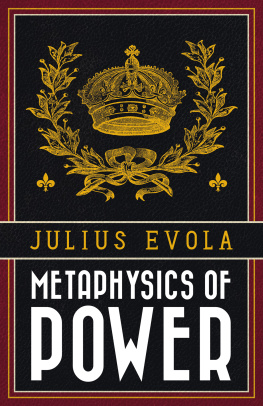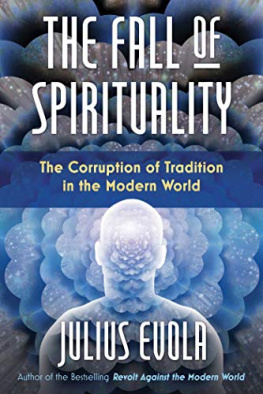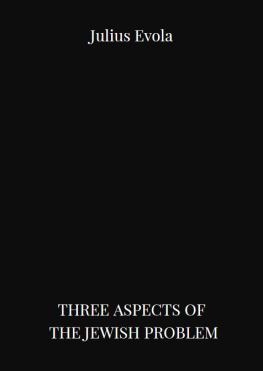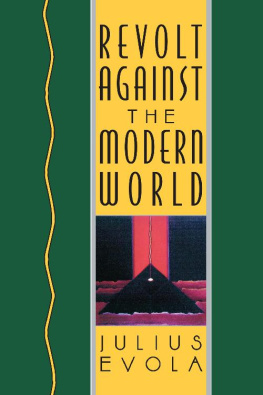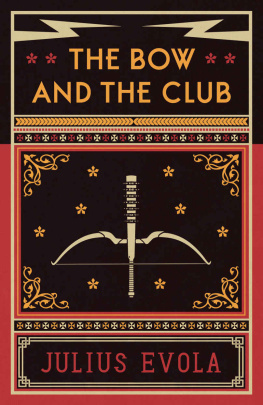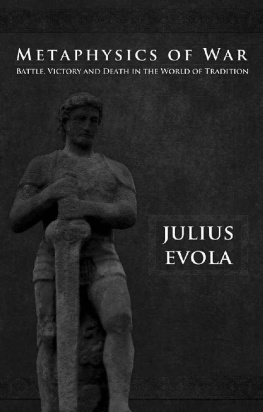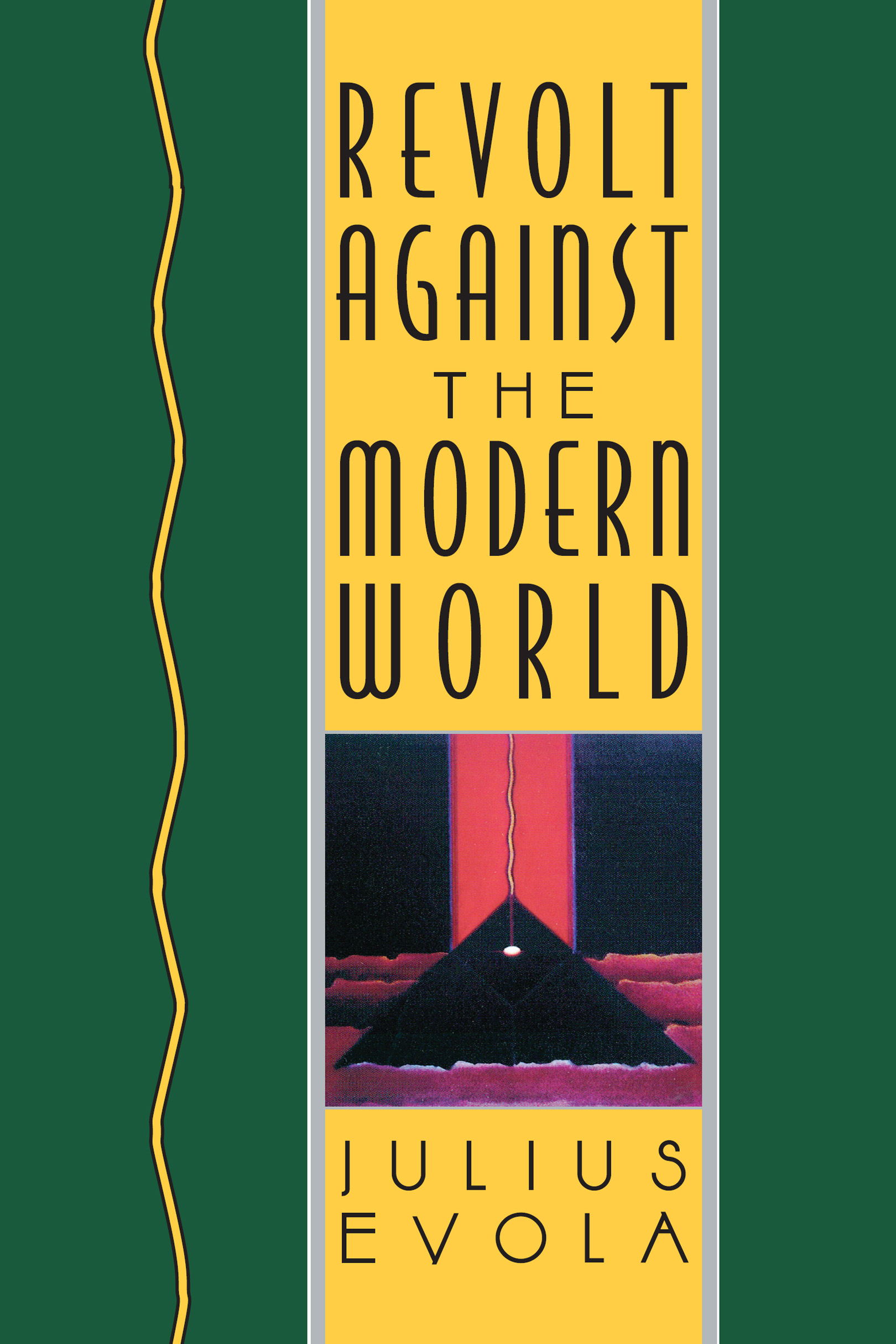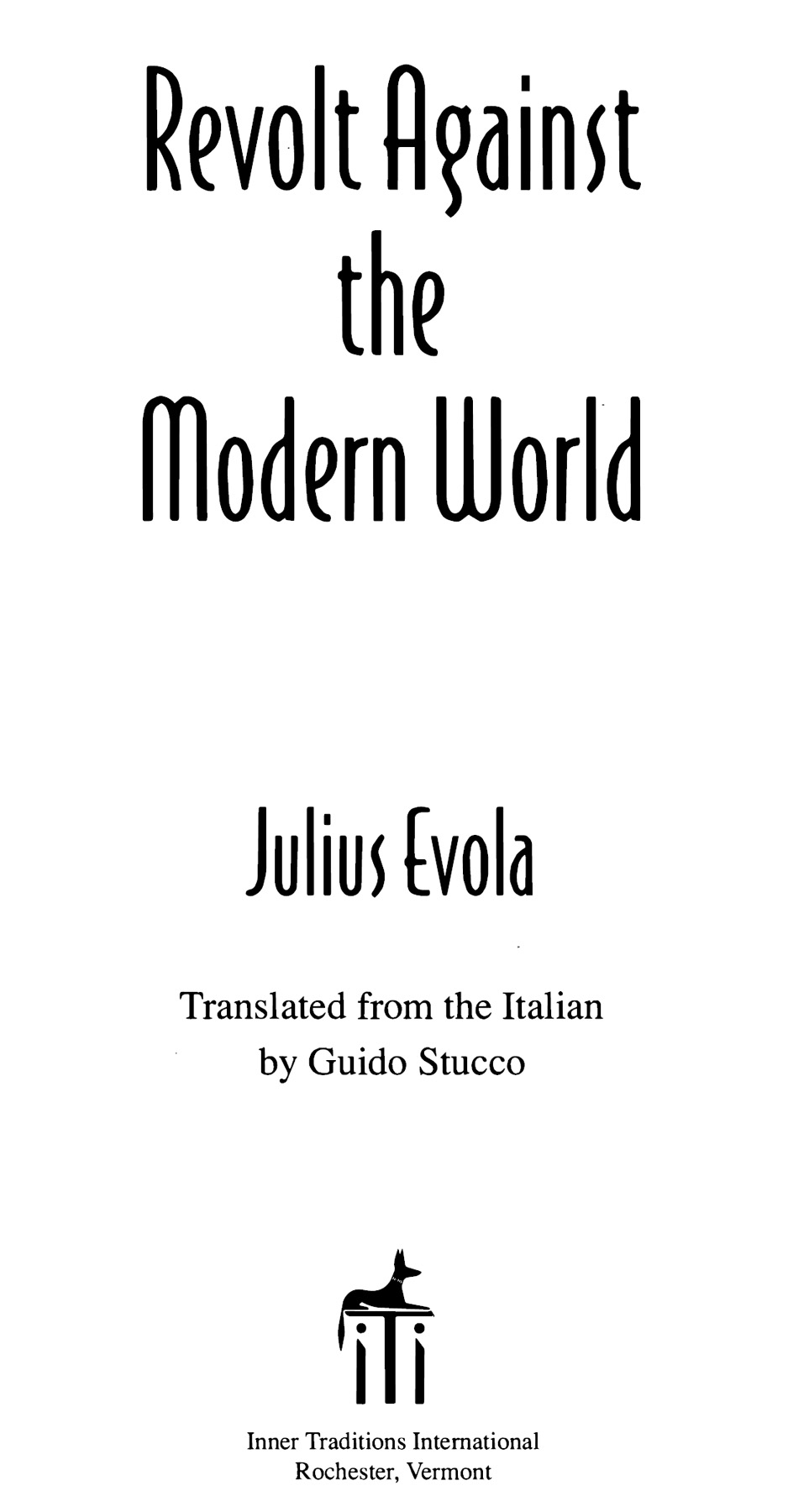To the
1st Battaglione Carabinieri Paracadutisti "Tuscania":
Caesarem Vehis!

A Short Introduction to Julius Evola
H. T. Hansen
J ulius Evola (18981974) is still relatively unknown to the English-speaking world, even in the traditional circles surrounding Ren Gunon, of whom he was his leading Italian representative. The major reason for this is that until recently little of Evola's work had been translated into English. This situation is being remedied by Ehud Sperling, president of Inner Traditions International. In addition toEros and the Mysteries of Love: The Metaphysics of Sex published in 1983, Inner Traditions has also brought out two of Evola's most important books, The Yoga of Power, on Tantrism, and The Hermetic Tradition, on alchemy. Following Revolt Against the Modern World, Inner Traditions will also republish Evola's masterful work on Buddhist asceticism, The Doctrine of Awakening.
Evola received some recent attention inGnosis magazine, where Robin Waterfield attempted to present a well-balanced view of him, which drew immediate protest. That Evola, on the other hand, had been from his youth in constant personal contact and correspondence with Mircea Eliade and the famous Tibetologist Giuseppe Tucci, is less well known.
But who actually was Julius Evola? His career was many-sided: As a philosopher he belongs among the leading representatives of Italian Idealism; as a painter and poet he is counted as one of the founders of Italian Dadaism; as a cultural historian and critic of our times, in addition to his Revolt Against the Modern World, he also translated Oswald Spengler'sDecline of the West, as well as Bachofen, Weininger, and Gabriel Marcel; as a patron of literature he was the publisher and translator of Ernst Jnger and Gustav Meyrink, whom he introduced into Italy; to some he might appear as an minence grise in politics, for Mussolini apparently wanted to implement some of Evola's ideas to create more freedom from the restrictions of National Socialism, and today, as then, right- and even some left-wing groups adopt him against his intentions; his important activities in the UR Group and many of his books testify to his understanding of alchemy and magic, and it is reported that Mussolini stood in considerable awe of Evola's "magical powers."
Ultimately, no definite answer to the question of who he was can readily be given, for Evola was apparently (to others) all of these things and yet (to himself) none of them. He saw himself as a member of the katriya or "warrior" class, who goes his way heedless of the praise or blame of others while simply wanting to do "what must be done, without thinking of success or failure." Only one thing was of primary importance: the "Above." For him transcendence was the be-all and end-all. From above derived all reasons for what happens below, and everything below must in turn be aligned to the above. Every thought and thing had to be judged as to whether it led upward. Only this resolute striving for the true foundation of all things can explain Evola's many nearly incomprehensible judgments and outlooks. His first aim was to turn toward transcendence and be liberated from Earth. Hence his constant attacks on "chthonic" religions, because they are terrestrial cults and not celestial religions. In these terrestrial cults, the Earth is the "Great Mother" and she alone has priority since she gives protection and help. Heaven, which in practically all cultures is regarded as male because it makes the womb of the earth fertile through the sun and rain, is therefore in those cults nearly insignificant beside her. And if one worships the earth, striving upward for heavenly transcendence is of no avail. Evola's path, however, is neither a search for consolation nor an abandonment of the self to the mother goddess with its consequent loss of the self. For Evola the earthly is not the path that leads to active liberation, to "awakening." On the contrary, it strengthens the "sleep" in which one gropes to return to the mother's womb. Evola values only the continuum of consciousness, the enduring presence, and the awakening of the thousand eyes as the essentials for achieving liberation.
What Joscelyn Godwin wrote about Ren Gunon is also true of Evola's esoteric work:
Mystical experience and religious devotion are certainly intrinsic elements of the spiritual path, but as Gunon never tired of emphasizing, the ultimate realization of a human being is through knowledge.
Some may find this whole approach too intellectual, but they cannot deny that the Traditionalist's discipline of metaphysics cuts like a razor through the sloppy thinking and sentimentality prevalent among "New Age" types. It sets standards of integrity against which other spiritual teachings either stand or fall. It assumes from the outset that the absolute truth has always been there for the finding, so it has no time for the fumblings of Western philosophy, so-called, nor for a science whose basic dogma is that man is still searching for the truth. And it incidentally forces a revaluation of all the modern ideals that most North Americans take for granted, such as individualism, equality, evolution and progress. One looks at the world with new eyes once one has passed through a Traditionalist re-education.
Since the chthonic or "Earth" religions go hand in hand with mother cults and their feminine leadership, Evola saw every matriarchal culture as further evidence of "deterioration." It was neither misogyny nor "patriarchism" that led him to this, but simply an intense striving for liberation from earthly bondage. In his eyes this liberation is all that matters; everything else is meaningless alongside it. To achieve this goal, no sacrifice is too great for him. Even one's own death becomes a "triumphal death," insofar as one is aware of it as a sacrifice undergone for this liberation. Who perishes in battle in this spirit is "godly," because for him the outer struggle is merely a symbol for the inner struggle against enslavement to earth. It is only from such a viewpoint that today we can grasp Evola's acceptance of the Hindu practice of sat. He sees it as the highest of devotions, precisely because it places perfect purity of purpose ahead of mere greed for life.
So asceticism is for Evola not a woeful and painful stifling of unlived passion, but simply a "technique" for setting the self free, a conscious step undertaken because one is aware of the Higher. He does not trust in grace and waiting, but wants to liberate himself through his own power. Consciousness therefore precedes unconsciousness, and to avoid any misunderstanding, Evola sharply differentiates the idea of higher consciousness from lower consciousness. A crystal-clear wakefulness characterizes the first, and surrender and self-sacrifice the latter. This is why Evola so often warns us about spiritualism and the usual "occult streams." These, he maintains, quoting Gunon, are even more dangerous than materialism. "Because of its primitivity and intellectual short-sightedness," materialism protected men from their own unconsciousness. In this regard, Gunon pointed out that rationalism, materialism, and positivism at first blocked the way for men to what lay


